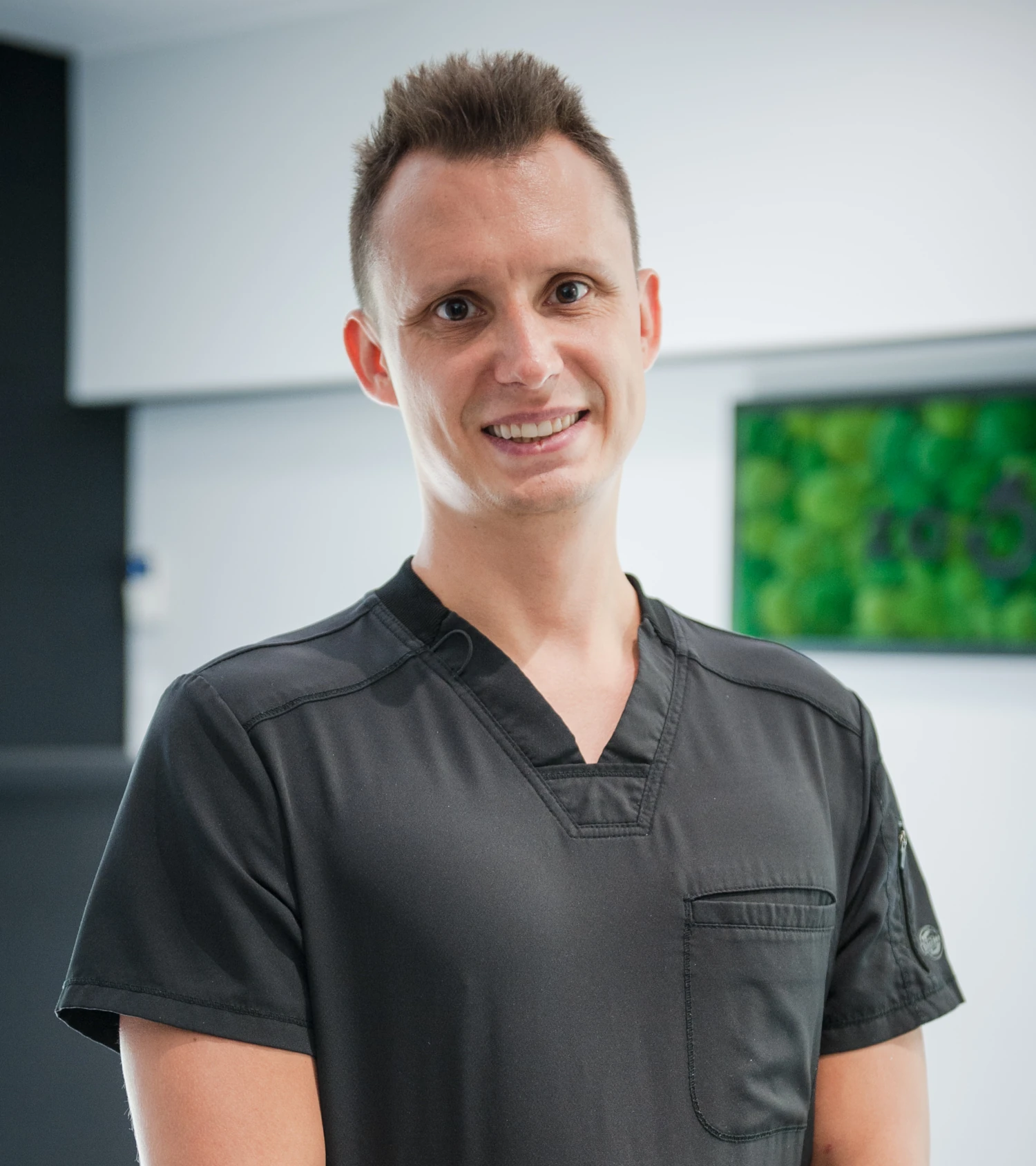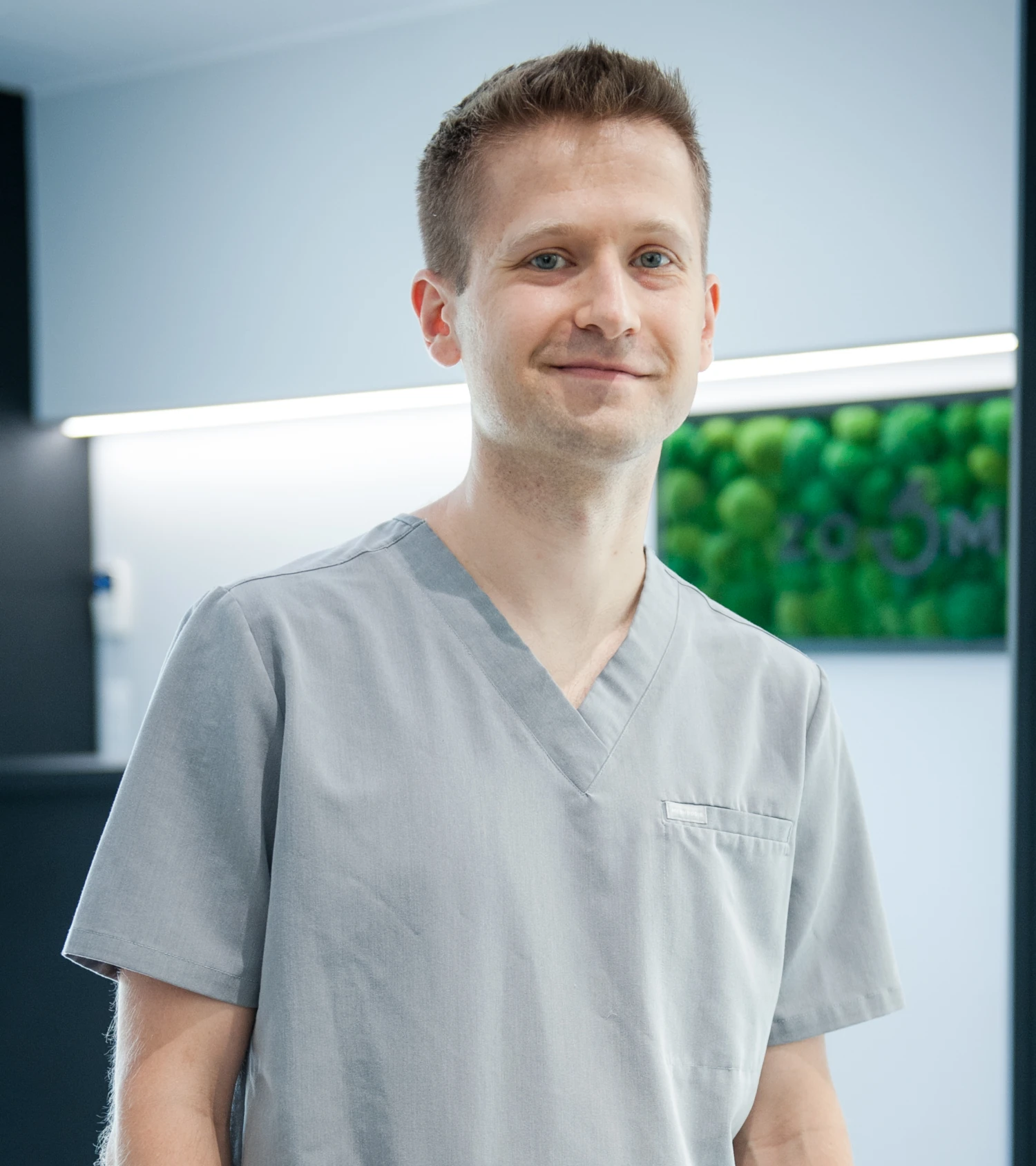Prosthetics
We will rebuild lost teeth, restoring the aesthetics, functionality and comfort of your smile
Dental prosthetics is a field of dentistry that deals with the reconstruction of missing teeth and the improvement of the aesthetics and functionality of the smile. Thanks to modern technologies and materials, prosthetics allow for the restoration of the natural appearance and comfort of the oral cavity, regardless of the degree of tooth loss. Prosthetic solutions can be attached to both natural teeth and implants (artificial tooth roots).
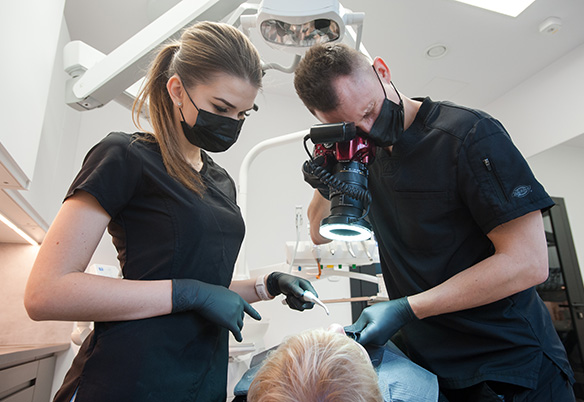
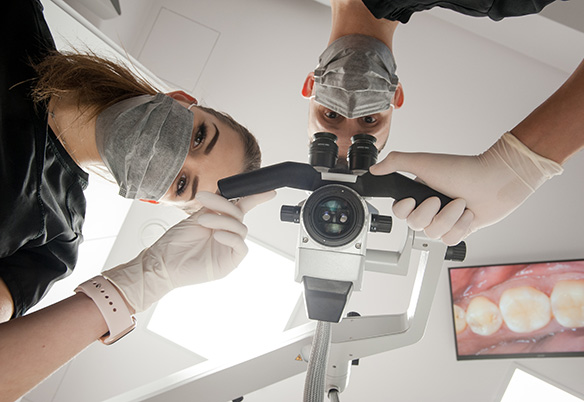
Modern in prosthetics
Our clinic uses the latest technologies and materials to provide our patients with the highest quality services. Thanks to digital impressions, precise 3D scanners and modern prosthetic materials, we can offer solutions that are both aesthetic and durable. Prosthetics is one of the fastest growing areas of dentistry, and we are actively participating in this process.
Why choose prosthetics?
• Restoring function: Prosthetics help regain full functionality of your mouth, allowing you to eat, speak and smile normally.
• Improved aesthetics: Modern prosthetic solutions can help you achieve a natural-looking smile, which increases self-confidence, rejuvenates and improves the quality of life. Restored teeth support the soft tissues of the cheeks and lips, reducing wrinkles and ensuring a youthful appearance.
• Protection of remaining teeth: Restoring missing teeth prevents the shifting of remaining teeth. This prevents bite problems and further tooth loss.
• Oral health: Prosthetics help maintain oral health by preventing problems such as jaw bone loss and gum disease. A proper bite allows for proper food grinding, which improves digestion.
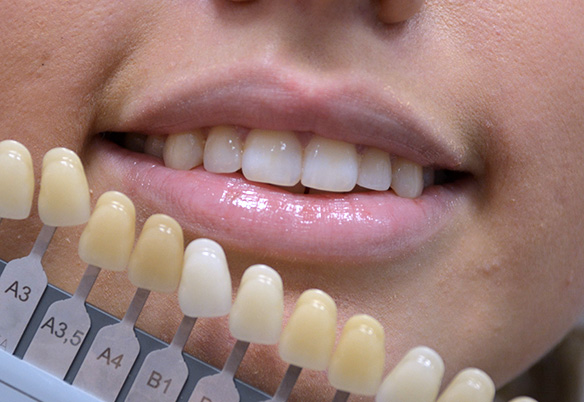
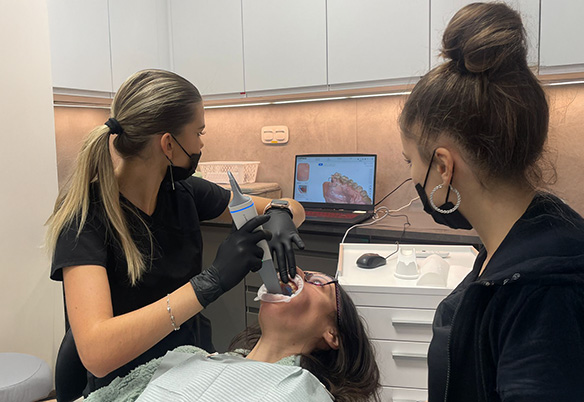
Types of prosthetic solutions
1. Crowns: Crowns are used to restore damaged teeth or as whole teeth on implants. Made of composite, ceramic, porcelain on zirconia or all-ceramic, crowns are durable and aesthetic.
2. Bridges: Bridges are dental solutions used to fill gaps between teeth. They are attached to adjacent teeth or implants and can replace one or more missing teeth.
3. Complete and partial dentures: Dentures are removable devices used to replace larger missing teeth. They can be complete (replacing all the teeth) or partial (replacing several teeth).
4. Implant-supported dentures: These dentures combine the advantages of implants and dentures, providing greater stability and comfort. They are an ideal solution for people who have difficulty with traditional removable dentures.
5. Veneers: Veneers are thin sheets of porcelain or composite that are bonded to the front surface of your natural teeth, improving their shape, color and aesthetics.
The treatment process prosthetic treatment
The prosthetic treatment process consists of several precise stages that allow for permanent and natural filling of missing teeth.
1. Consultation
The first step is a consultation with a prosthodontist who will assess the condition of your mouth, perform the necessary tests and discuss available treatment options.
2. Treatment planning
Based on the information collected, an individual treatment plan will be developed, taking into account your needs and expectations.
3. Preparation of teeth
In the case of crowns and bridges, the teeth must be prepared accordingly (replacement of fillings, reduction of tissue). In the case of implants, a surgical procedure is necessary.
4. Production and fitting of prosthetic work
Once the denture is made in the dental laboratory, it is tried on and fitted to the patient's mouth. If necessary, adjustments are made to ensure optimal comfort and functionality.
5. Check-ups and care
Regular check-ups are essential for maintaining your oral health and the durability of your dentures. You should also maintain your denture hygiene as recommended by your dentist.
When is it worth applying?
for a consultation with a prosthetist?
Loss of one or more teeth
If you have lost one or more teeth due to injury, gum disease, tooth decay or other causes, a prosthodontist will help you find the best prosthetic solution, such as crowns, bridges or implants.
Damaged or damaged teeth
In the case of teeth that are significantly damaged, broken or weakened, the prosthodontist may suggest reconstruction with crowns that will restore the teeth's full functionality and aesthetics.
Problems with removable dentures
If you have difficulty wearing traditional removable dentures, such as looseness, discomfort, or difficulty eating, consulting a prosthodontist can help you find more stable and comfortable solutions, such as implant-retained dentures. Removable dentures should be replaced every 5 years.
The desire to improve the aesthetics of your smile
If you are unhappy with the appearance of your teeth - their shape, color or position - a prosthodontist can suggest various aesthetic solutions, such as veneers, full ceramic crowns or teeth whitening. A beautiful and healthy smile adds self-confidence and is the best investment.
Biting and chewing problems
Missing teeth or improperly positioned teeth can cause difficulty in biting and chewing food. A prosthodontist will help restore full functionality of the oral cavity, which will improve the comfort of eating and digestion, and in the long term, even the patient's overall health.
Pain and discomfort in the oral cavity
If you experience pain or discomfort due to excessive wear of your teeth, your dentist can assess your oral health and recommend appropriate treatment to alleviate or alleviate your symptoms.
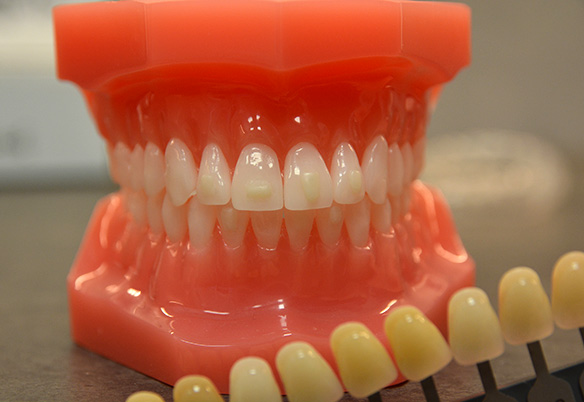
Malocclusion and changes in tooth position
Missing teeth lead to shifting of the remaining teeth and the development of malocclusions. Early prosthetic intervention can prevent these problems and maintain proper teeth alignment well into old age.
Bone loss of the jaw or mandible
After losing teeth, the jawbone decreases in quantity and volume, i.e. it atrophies. Dental implants prevent this process by stimulating the bone to perform its proper function and maintaining its healthy structure.
Loss of self-confidence
Missing teeth can affect your social and professional life, lowering your selfconfidence. A prosthodontist can help you restore a beautiful smile, which in turn will improve your well-being and self-confidence. It is also a natural way to rejuvenate your face.
Regular check-ups and oral health maintenance
Even if you don't experience any problems, regular visits to your dentist are crucial to maintaining your oral health and preventing future problems.
Price list
Inlay / Onlay / Overley composite
1 300 PLN
Inlay / Onlay / Overlay porcelain
1 600 PLN
Temporary crown made in the office
250 PLN
All-ceramic crown
1 790 PLN
Composite crown
1 300 PLN
Veneer
from 1 790 PLN
Skeletal prosthesis
from 3 200 PLN
Complete denture
from 2 200 PLN
OURS
Transformations

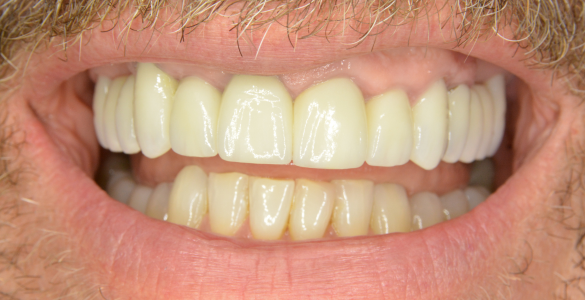
Comprehensive treatment: restoration of missing teeth with implants, treatment of caries under crowns, and replacement with high-aesthetic crowns.
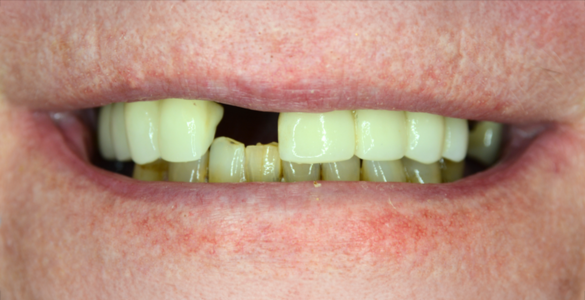
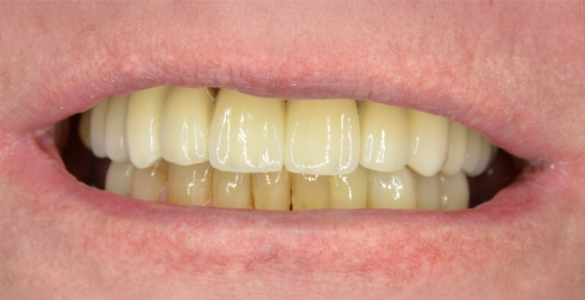
Before treatment, missing teeth, uneven alignment, and discoloration were evident. After comprehensive care, a complete and aesthetic smile was achieved through prosthetic restorations.
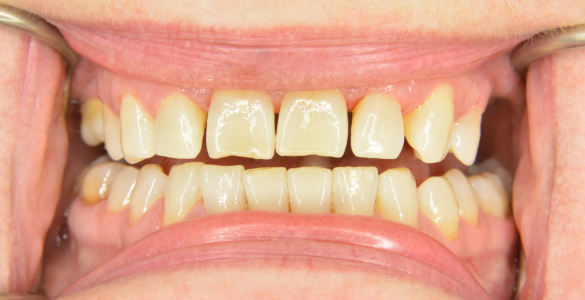
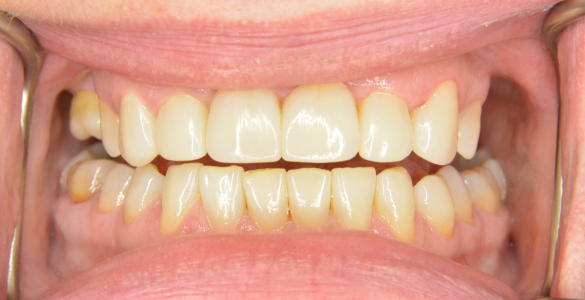
Aesthetic enhancement: restoration of anterior teeth using composite material.
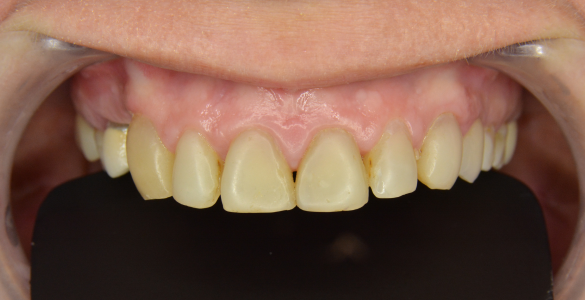
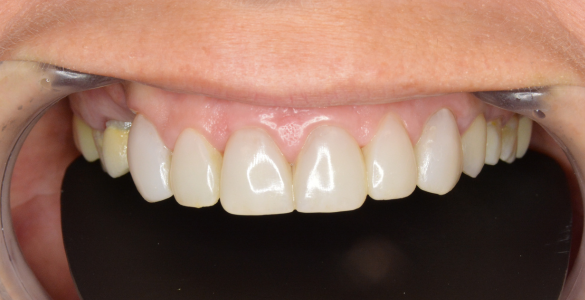
Aesthetic enhancement of six anterior teeth using composite veneers through bonding.
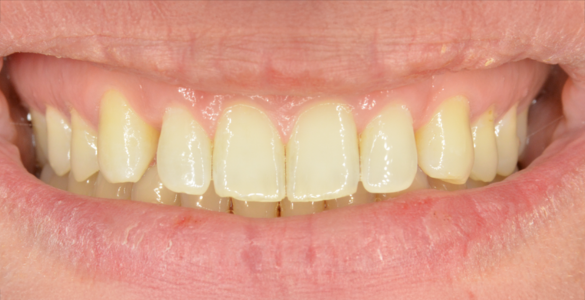

Closure of interdental gaps via bonding restorations – composite veneers.
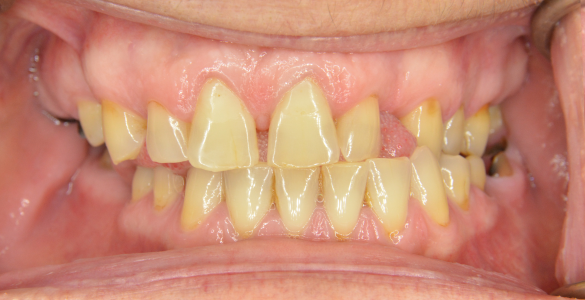
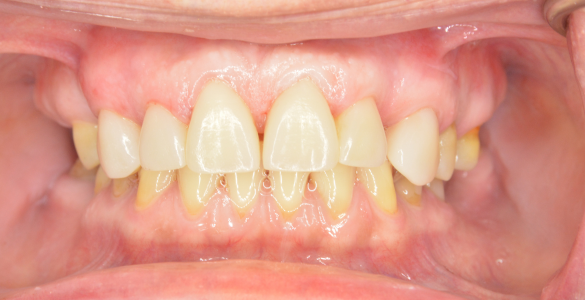
Aesthetic modification to mask imperfections without orthodontic treatment.
A well-coordinated Team
Dr. Piotr Wolny's team combines cutting-edge technologies with passion and care for each patient
FAQ
What is dental prosthetics?
Dental prosthetics is a branch of dentistry focused on restoring missing teeth and improving the aesthetics and functionality of teeth using crowns, bridges, onlays, dentures, and implants.
When should you visit a prosthodontist?
It is worth visiting a prosthodontist if you have lost one or more teeth, have severely damaged or destroyed teeth beyond the scope of treatment with simple fillings, or are experiencing issues with removable dentures. Other reasons include a desire to improve the aesthetics of your smile, difficulty biting or chewing, or any problems or discomfort related to missing teeth.
What are the types of prosthetic solutions?
The most popular prosthetic solutions include crowns, bridges, onlays, complete and partial dentures, implant-supported dentures, and veneers. Each of these options has specific applications and benefits.
What are crowns and what are they used for?
Crowns are caps placed over severely damaged teeth to restore their shape, size, and function while enhancing their strength. They can be made from various materials, such as ceramic, porcelain fused to zirconia, or all-ceramic options. Crowns are also used on dental implants.
What are dental bridges?
Dental bridges are structures designed to replace one or more missing teeth. They are anchored to adjacent teeth or implants and consist of crowns placed on both ends (abutments) and artificial teeth in between. Bridges are made from the same materials as crowns but are reinforced for added strength.
What are the types of dentures?
There are complete dentures, which replace all teeth in a dental arch, and partial dentures, which fill in gaps in the dentition. They can be removable or fixed on implants or natural teeth for greater stability.
What are veneers and what are they used for?
Veneers are thin shells made of porcelain or composite material that are bonded to the front surface of teeth. They improve the aesthetics of teeth by correcting their shape, color, and size. Veneers can also restore slightly damaged or worn teeth.
How long does the prosthetic treatment process take?
The duration of prosthetic treatment depends on the type of solution and the individual needs of the patient. It can range from a few days to several months, taking into account healing periods and fittings.
Is prosthetic treatment painful?
No, most prosthetic procedures are performed under local anesthesia, which eliminates pain. After the procedures, there may be slight discomfort, which usually subsides within a few days.
How to care for dentures and other prosthetic solutions?
Dentures and other prosthetic solutions require regular hygiene care for both the oral cavity and the prosthetic restorations. It is also important to visit the dentist regularly for examinations and professional cleaning.
What are the costs of prosthetic treatment?
The costs of prosthetic treatment depend on the type of solution, materials used, the extent of the work, and the individual needs of the patient. During the consultation, the prosthodontist will provide a detailed treatment plan and the associated costs.
